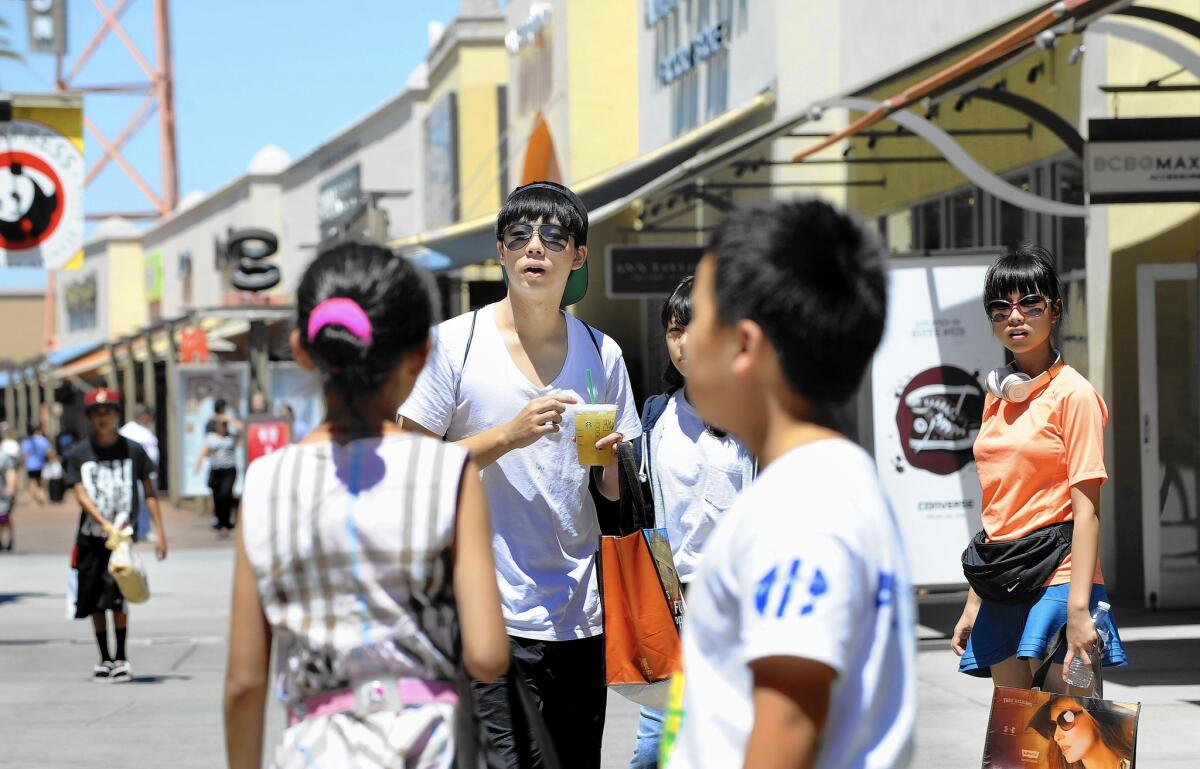China’s financial turmoil won’t disrupt California’s economy

Turmoil in China’s financial markets has sent global stocks into a tailspin for the first week of the year, adding to months of concern that weakness in the world’s second-largest economy could trigger a ripple effect globally.
Signs of a slowdown are already showing up in the United States, with a number of businesses across California — a major hub for Pacific Rim trade and investment — starting to feel the squeeze.
Sales of dried fruits and nuts for next month’s Chinese New Year have barely gotten off the ground. Tech giants such as Apple Inc. have been jolted by news of the instability. The most recent trade numbers show California’s fall exports to China declined 12.1% from a year earlier.
Despite those disappointments, experts said slowing demand in China isn’t enough to disrupt California’s $2.3-trillion economy. Exports to China represent only about 1% of U.S. gross domestic product, for instance, and panic overseas could actually spark more investment in California’s attractive real estate markets.
The bigger risk to the U.S. and California economies would come if volatility in China continued to roil U.S. and global financial markets over an extended period of time, destabilizing the broader economy.
“The Chinese really depend much more on America than we depend on the Chinese,” said William Yu, an economist with the UCLA Anderson Forecast who has studied the intersection of the California and Chinese economies. “The good side of this is that we don’t rely on exports much. We never have. The backbone of our economy is the American consumer.”
One sign of the continued strength of American buyers is the healthy flow of imports through the ports of Los Angeles and Long Beach, which handle much of the U.S. trade with China. Despite a partial shutdown of West Coast ports during a contract dispute early last year, import traffic at the two Southern California ports last year was down only slightly from 2014.
In that sense, manufacturers in China will be relying even more heavily on exports to the United States and other parts of the world as homegrown demand could fade.
But in an increasingly interconnected world, a sustained slowdown in China could spread its tentacles across the globe — and across industries.
Tech firms, for example, bank on Chinese growth to offset stagnant sales in the West.
Apple is set to double its Chinese stores to 40 this year, one of the reasons analysts think China will become the tech giant’s biggest market as soon as 2017.
But recent reports of diminished iPhone orders from Chinese suppliers underscore the risk Apple faces. The company’s shares have plunged twice in the last six months, both times because of woeful Chinese economic news.
“Apple has a lot riding on China,” said Daniel Ives of FBR Capital Markets.
Other Golden State firms including Cisco Systems, Intel Corp. and Qualcomm Inc. have ventures in China, a country whose size offers breathtaking opportunity.
Start-ups also face risks if volatility in China’s markets continues to spill over into the U.S. financial system.
Seeking to capitalize on rapid growth in tech, Fidelity Investments, BlackRock and other mutual and hedge funds have feverishly bankrolled the rise of Uber Technologies, Snapchat and dozens more start-ups. But venture capitalists are concerned that pace could dwindle if investors focus on more surefire bets such as bonds or other fixed-income investments.
The pullback would come at a time when start-up investing is already falling from a peak in 2014. That could force some cash-hungry start-ups to sell, fold or go public earlier than planned in the months to come.
“A lot of the stock market is driven by macrofactors, and the largest factor right now is China,” said Jeff Lee, whose venture firm DCM Ventures focuses on the U.S., China and Japan. “Folks are going to flee to safety, so they are going to be less worried about chasing returns and more focused on protecting assets.”
On the other hand, U.S. tech service companies such as Airbnb and Uber might actually fare better in a downward-moving Chinese economy, said Hans Tung, managing partner at venture capital firm GGV Capital. Tung, who flies to China monthly from Silicon Valley, said economic jitters will spur increased cautiousness, giving an edge to merchants that provide affordable alternatives.
“Younger users still have very good disposable income,” Tung said. “And they’re going out of China once a year or twice a year, but at lower budgets.”
Airbnb, which received funding from GGV, provides Chinese travelers a cheaper alternative to hotel rooms. And Uber is winning over consumers by using $1 billion in investment cash to price fares below local competitors in China.
Southern California’s real estate markets in recent years have also become highly popular with Chinese companies looking for a safer place to put their money, said attorney Mike Margolis, a partner with Blank Rome who works with Chinese developers.
“Our many clients in the real estate development arena are not indicating any kind of pullback,” he said. Noor Menai, chief executive of downtown L.A.’s CTBC Bank, which specializes in working with Chinese immigrant business owners, said the market turmoil in China validates why so many wealthy Chinese have left the country or made investments overseas. If anything, he expects this most recent round of market upheaval to spur more Chinese investors to move money overseas.
“This has been a slow-motion thing happening over the last five years. Now someone’s released the slow-motion button and you’re seeing it in real time,” he said. “It’s bad news for China, but good news for California and other markets where Chinese investment usually goes.”
Indeed for some firms, the slowdown abroad was a major reason to build up their businesses in the United States.
Chinese home builder Landsea, for example, announced in 2014 that it would plow $1 billion into the U.S. housing market.
Join the conversation on Facebook >>
Tourism and entertainment, two major California industries that have thrived amid growing Chinese consumers, haven’t yet seen signs of a slowdown. The average number of monthly passengers arriving at Los Angeles International Airport on China’s three major airlines increased 8% in 2015 over the previous year.
A rising middle class has spawned a surge in construction of movie theaters in small cities across China. The country added 9,000 screens in 2015 and the pace is not expect to slow down this year.
While Chinese consumers may cut back on purchases of some higher ticket items such as cars, they aren’t likely to curtail movie ticket purchases, which are still relatively affordable in China, said Imax Corp. Chief Executive Richard Gelfond. The cinema industry enjoys the strong backing of the Chinese government, which views film as an important growth engine.
“Hollywood and entertainment has everything to do with the way they are going,” Gelfond said.
But California exporters of agricultural goods haven’t fared as well. At Meridian Growers, a Clovis company that grows and sells nuts and dried fruit, sales to China were down nearly 60% last year from 2014.
Jim Zion, Meridian’s managing partner, said buyers in China seem wary of taking on too much inventory, even ahead of the Chinese New Year, when nuts are a popular gift. The company typically sees a spike in sales in October and November as retailers prepare for the celebration.
“We just didn’t see it happen this year,” Zion said.
Times staff writers Ryan Faughnder, Andrew Khouri, Hugo Martin and David Pierson contributed to this article.
ALSO
Claims in Porter Ranch gas leak could cost utility billions of dollars
NFL wants a team or two in L.A., and owners head to Houston for a vote
3 teens from China will go to prison for a San Gabriel Valley attack on a classmate
More to Read
Inside the business of entertainment
The Wide Shot brings you news, analysis and insights on everything from streaming wars to production — and what it all means for the future.
You may occasionally receive promotional content from the Los Angeles Times.











